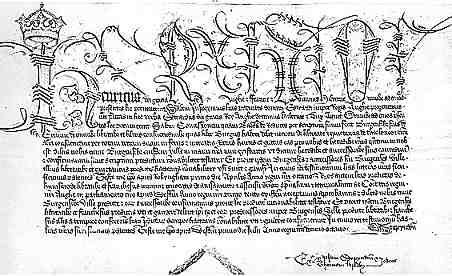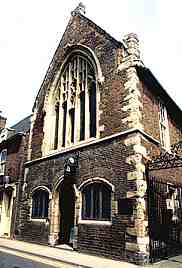



If you are looking at this page without frames, there is more information about medieval writing to be found by going to the home page (framed) or the site map (no frames).
| Borough Charters (2) | |
| The granting of borough charters increased greatly during the reigns of Richard I and John, in the late 12th and early 13th centuries. It was fairly common for such charters, like many others, to be renewed or confirmed at the beginning of a new reign, just in case the new king decided to be a bit absent minded about the privileges his ancestors had conferred. Not all towns were under the lordship of the king directly, and around this time many boroughs were granted independence by charter from local landholders or church authorities, although a charter from the king was a better bet in the long term. | |
 |
|
| Confirmation by Henry VI in 1440 of the franchises granted to the burgesses of Yarmouth, Isle of Wight (British Library, add. charter 19650). (From New Palaeographical Society 1910) | |
| The above document represents a confirmation of privileges already granted, initially by Baldwin de Redvers, 1st Earl of Devon, in the 12th century and later confirmed by Edward III in 1334. It confirms the rights of a free borough, with freedom from tolls and other custom on their lands in fairs and markets. The exquisitely neat chancery hand is not really visible at this magnification, but the highly elaborated and enlarged initial letters of the top line can be seen as adding weight to the document. I personally am rather taken with the little crown perching on top of the H of Henricus. The document has a seal which is not visible in the photograph. | |
 |
The granting of a borough charter led to the development of a whole new layer of bureaucracy and written record keeping as the records of various town officials were maintained. Substantial guildhalls of the late middle ages can be found in many old towns, as centres of this town government. |
| The late medieval guildhall of Boston, Lincolnshire. | |
| Town corporations developed their own systems of record keeping for the matters under their jurisdiction. | |
 |
|
| Beginning of a copy of a 16th century letter in the minute book of the corporation of York (York City Archives, B XVI). By permission of York City Archives. | |
| Various specialised officials had to keep records of the tolls, licences and other matters under their control. | |
 |
|
| Segment from the bridgemaster's roll at York (York City Archives, C 88:4). By permission of York City Archives. | |
| The borough charter was just the first stage in the development of a further level of literate bureaucracy at the local level. The complexities of town life pushed the need for literate social management further into the ordinary levels of society, affecting the activities of those who were not literate themselves, but whose modes of living were controlled by literate processes. | |
|
|
|
|
|
|
|
If you are looking at this page without frames, there is more information about medieval writing to be found by going to the home page (framed) or the site map (no frames). |
|